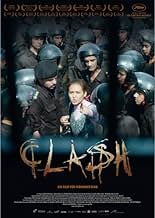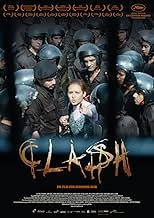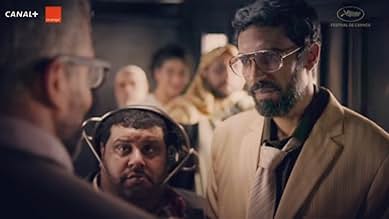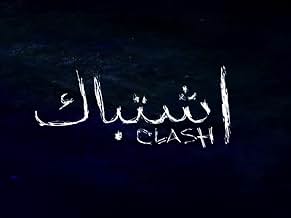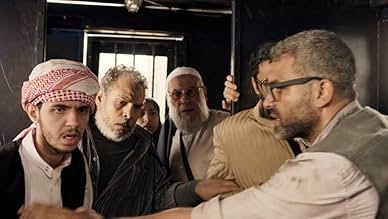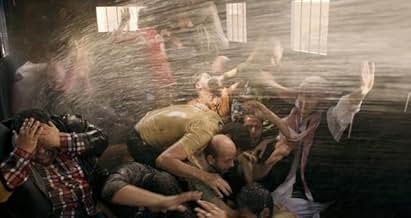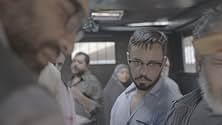PUNTUACIÓN EN IMDb
7,4/10
6,4 mil
TU PUNTUACIÓN
Ambientada en su totalidad en un furgón policial de ocho metros, el destino reúne a varios detenidos de diferentes orígenes sociales y políticos durante los disturbios que siguieron al derro... Leer todoAmbientada en su totalidad en un furgón policial de ocho metros, el destino reúne a varios detenidos de diferentes orígenes sociales y políticos durante los disturbios que siguieron al derrocamiento del entonces presidente Morsi.Ambientada en su totalidad en un furgón policial de ocho metros, el destino reúne a varios detenidos de diferentes orígenes sociales y políticos durante los disturbios que siguieron al derrocamiento del entonces presidente Morsi.
- Dirección
- Guión
- Reparto principal
- Premios
- 13 premios y 9 nominaciones en total
Muhammad El-Sebai
- Zain
- (as Mohamed El Sebaey)
Mohamed Elsewisy
- Uwais
- (as Mohamed El Souisy)
Ahmad Abdulhamid Hifni
- Awadh
- (as Ahmed Abdel Hamid)
Husni Sheta
- Fishoo
- (as Hosny Sheta)
Dash Ahmed
- Fares
- (as Ahmad Dash)
Gamil Barsoom
- Salah
- (as Gameel Barsoum)
Muhammad Tareq
- Hussein
- (as Mohamed Tarek)
Muhammad Gamal Qalbaz
- Tamer
- (as Mohamed Gamal Kalbaz)
Reseñas destacadas
The idea of a film set entirely within a police truck in Cairo does not seem a particularly enticing prospect. Writer, director Mohamed Diab manages, however, to make this both riveting and exciting. With the considerable mix of Egyptians packed together and the troubles raging on the streets outside, this is an incredibly potent mix of actions, emotions and life changing moments. Clearly, the van load of Muslim Brotherhood supporters, Christians, police and their supporters brings all into conflict but also provides the opportunity to consider compromise and the possibility of swapping conflict for reconciliation. At the same time this is a thunderingly exciting film with provocative and believable dialogue and wincingly, in your face action. Interrupted momentarily whilst watching, I returned to my seat to become aware of just how fast my heart was racing. Stunning filmmaking and easily enjoyed without considering the political dimensions but even more potent in doing so.
I appreciate a lot of what this attempts, even if it doesn't always mesh together for a good film.
The acting is more than decent, the cinematography is impressive given the obvious limitations and the story it's attempting to share is compelling. However, I don't think there's enough there for a full-blown film. All the characters have their own story and motives which aren't overly developed, which generally leads to shouting matches every five minutes - which is simply irritating to watch.
I, admittedly, do not know anything close to enough about the Egyptian uprising of 2013, but every character says something or does something that I just find purely nonsensical; to the point where I'm not sure it would even happen in real life. Perhaps I'm wrong, certainly a possibility, though it just comes across that the filmmakers had loads of stories to tell and just crammed them in without making them appear logical.
I still find 'Clash' extremely interesting and admire how it's all filmed and put together, I just feel that the premise wears thin a tad.
The acting is more than decent, the cinematography is impressive given the obvious limitations and the story it's attempting to share is compelling. However, I don't think there's enough there for a full-blown film. All the characters have their own story and motives which aren't overly developed, which generally leads to shouting matches every five minutes - which is simply irritating to watch.
I, admittedly, do not know anything close to enough about the Egyptian uprising of 2013, but every character says something or does something that I just find purely nonsensical; to the point where I'm not sure it would even happen in real life. Perhaps I'm wrong, certainly a possibility, though it just comes across that the filmmakers had loads of stories to tell and just crammed them in without making them appear logical.
I still find 'Clash' extremely interesting and admire how it's all filmed and put together, I just feel that the premise wears thin a tad.
The movie opens with a few lines recounting the events that led to the heated rivalry between the Army (& pro-army supporters) and the Muslim Brotherhood (henceforth 'MB'); the camera having set its gaze inside an army truck.
A couple of journalists (who claim to be neutral to both factions) are arrested and brought into the truck. Their attempts at drawing an Anti-MB mob's attention to assist in their escape backfire when the senior reporter is observed to capture the incident on a watch that doubles as a camera. The army is forced to apprehend the mob for pelting stones and lock them inside the truck.
One thing leads to another and before we know it, a bunch of MB supporters are taken into custody and put along with the rest of the detainees in the truck. The situation outside is tense in itself, but imagine supporters of two rickety factions being forced to share a claustrophobic space together. The numbers comprise people not just with different political ideals, but of varied age-groups, religions and genders.
The writing is sensationally solid with lines given to members from both divisions to substantiate their character arcs. But circumstances are such that, eventually, all of them start to wilt and run out of hope (and breath) while stuck inside the van, left undeniably helpless when it comes to saving their own butts before their loved ones'.
The crowd includes individuals who are friends, relatives, acquaintances and even colleagues. Although it might seem a little difficult to follow the names and faces of each of the characters, the writing/direction is sublime enough to collectively grasp the divided opinion. What's astonishing here is how the Diabs even manage to bring in some unexpected comic relief as well in the form of a brilliantly-written scene involving a wannabe actor/singer, that is just a fleeting moment of joy before terror strikes yet again.
Cinematography work (by Ahmed Gabr) is first-rate. Even though shooting within the confined setting of the film must have been strenuous, there are plenty of visuals (and scenes in totality) that stick with the viewer: the adolescent woman who struggles hard to hold nature's calls but seemingly gives in at one point, the aspiring DJ who has had enough of seeing everyone around him riot and settles into his own "happy zone" by listening to music from his phone, the soldier who disobeys orders while delineating his humanitarian side, the reversal of fate for another officer (the list is endless!).
The crafting of the riot scenes taking place outside is magnificently believable and terrifying to perceive. To add to the positives of the film, the climactic finale was indeed difficult to envisage. The tagline of the film says "Conflict is on the Inside" and it reinstates this through a powerful narrative which delves into both political and personal strife. The film rightfully deserves a bigger audience and greater appreciation than it has already been earning.
Verdict: Must-watch!
A couple of journalists (who claim to be neutral to both factions) are arrested and brought into the truck. Their attempts at drawing an Anti-MB mob's attention to assist in their escape backfire when the senior reporter is observed to capture the incident on a watch that doubles as a camera. The army is forced to apprehend the mob for pelting stones and lock them inside the truck.
One thing leads to another and before we know it, a bunch of MB supporters are taken into custody and put along with the rest of the detainees in the truck. The situation outside is tense in itself, but imagine supporters of two rickety factions being forced to share a claustrophobic space together. The numbers comprise people not just with different political ideals, but of varied age-groups, religions and genders.
The writing is sensationally solid with lines given to members from both divisions to substantiate their character arcs. But circumstances are such that, eventually, all of them start to wilt and run out of hope (and breath) while stuck inside the van, left undeniably helpless when it comes to saving their own butts before their loved ones'.
The crowd includes individuals who are friends, relatives, acquaintances and even colleagues. Although it might seem a little difficult to follow the names and faces of each of the characters, the writing/direction is sublime enough to collectively grasp the divided opinion. What's astonishing here is how the Diabs even manage to bring in some unexpected comic relief as well in the form of a brilliantly-written scene involving a wannabe actor/singer, that is just a fleeting moment of joy before terror strikes yet again.
Cinematography work (by Ahmed Gabr) is first-rate. Even though shooting within the confined setting of the film must have been strenuous, there are plenty of visuals (and scenes in totality) that stick with the viewer: the adolescent woman who struggles hard to hold nature's calls but seemingly gives in at one point, the aspiring DJ who has had enough of seeing everyone around him riot and settles into his own "happy zone" by listening to music from his phone, the soldier who disobeys orders while delineating his humanitarian side, the reversal of fate for another officer (the list is endless!).
The crafting of the riot scenes taking place outside is magnificently believable and terrifying to perceive. To add to the positives of the film, the climactic finale was indeed difficult to envisage. The tagline of the film says "Conflict is on the Inside" and it reinstates this through a powerful narrative which delves into both political and personal strife. The film rightfully deserves a bigger audience and greater appreciation than it has already been earning.
Verdict: Must-watch!
There has been much anticipation and controversy preceding the theatrical release in Egypt with several rumors that it will get censored on not released at all and a reporter on National TV called the director a "traitor" and an "anarchist who only focuses on the bad aspects of Egyptian society to capitalize on them." But although it's the most political film to be released in Egypt after the revolution ,in a market dominated mostly by comedies and Hollywood blockbusters, it comes off as mostly apolitical.
Clash is the second feature film for writer/director Mohamed Diab taking place in early July 2013 after president Mohamed Morsi was overthrown by the army and many people took off to the streets either to celebrate or protest. Starting in an empty police car of about eight meters square which soon gets filled with different people arrested in the protests ranging from an American/Egyptian reporter to revolutionaries and Muslim Brotherhood supporters to a group of young men who had nothing to do with it all except that they happened to be walking by.
Tensions arise and we start to see the sheep mentality of both the Muslim Brotherhood members who only talk to each other and refuse to stand next to the others and that of the policemen who refuse to giver the arrested water as they were not "ordered" to.
But the movie doesn't focus on their political affiliations and portrays them as only humans. We see the revolutionary nurse helping a wounded M.B member. They sing, they share their memories during the Arab Spring revolution. The short running time may not allow to dig deeper into the characters but I believe it focuses on living the experience by confining our POV inside the car during the whole movie making us feel as hopeless and suffocated as those trapped who aren't even allowed to pee and instead are shown how to do it in a bottle.
The dialogue sometimes seems a little childish and some things felt like they were thrown in just to increase the running time as the argument between Mans and his friend who found out that Mans is sending romantic messages to the his sister.
The clash scenes between the police and the protesters were masterful and showing them only through the car windows makes them seem even more colossal giving a real feeling of the chaos. The ending was cinematically beautiful with the green lasers all over the place. Although the ending may seem a little unsatisfying to some (including me at first), I think it's the perfect reflection of the current thinking in Egypt.
After The Revolution in 2011 during the Arab Spring, everyone, especially the youth, started thinking of his own utopia and were looking forward to a "New Egypt" only to see their dreams evaporate as they saw the same mistakes being repeated again, their political leaders betraying them, giving them only false promises and sweet talk. As I am writing this now, the economy is at its lowest with the rich/poor gap widening gradually, the budget for health and education dwindling, the political arena is filled with the same faces or new faces with the same mindset of the old regime. Censorship touches everything and there have even been talks to censor the Social media. so you can't really blame them for losing hope and abandoning their dreams and not seeing the light at the end of the tunnel. For them there is only darkness-nothing else.
Clash is the second feature film for writer/director Mohamed Diab taking place in early July 2013 after president Mohamed Morsi was overthrown by the army and many people took off to the streets either to celebrate or protest. Starting in an empty police car of about eight meters square which soon gets filled with different people arrested in the protests ranging from an American/Egyptian reporter to revolutionaries and Muslim Brotherhood supporters to a group of young men who had nothing to do with it all except that they happened to be walking by.
Tensions arise and we start to see the sheep mentality of both the Muslim Brotherhood members who only talk to each other and refuse to stand next to the others and that of the policemen who refuse to giver the arrested water as they were not "ordered" to.
But the movie doesn't focus on their political affiliations and portrays them as only humans. We see the revolutionary nurse helping a wounded M.B member. They sing, they share their memories during the Arab Spring revolution. The short running time may not allow to dig deeper into the characters but I believe it focuses on living the experience by confining our POV inside the car during the whole movie making us feel as hopeless and suffocated as those trapped who aren't even allowed to pee and instead are shown how to do it in a bottle.
The dialogue sometimes seems a little childish and some things felt like they were thrown in just to increase the running time as the argument between Mans and his friend who found out that Mans is sending romantic messages to the his sister.
The clash scenes between the police and the protesters were masterful and showing them only through the car windows makes them seem even more colossal giving a real feeling of the chaos. The ending was cinematically beautiful with the green lasers all over the place. Although the ending may seem a little unsatisfying to some (including me at first), I think it's the perfect reflection of the current thinking in Egypt.
After The Revolution in 2011 during the Arab Spring, everyone, especially the youth, started thinking of his own utopia and were looking forward to a "New Egypt" only to see their dreams evaporate as they saw the same mistakes being repeated again, their political leaders betraying them, giving them only false promises and sweet talk. As I am writing this now, the economy is at its lowest with the rich/poor gap widening gradually, the budget for health and education dwindling, the political arena is filled with the same faces or new faces with the same mindset of the old regime. Censorship touches everything and there have even been talks to censor the Social media. so you can't really blame them for losing hope and abandoning their dreams and not seeing the light at the end of the tunnel. For them there is only darkness-nothing else.
After the screening in the London Film Festival, when the director and producer came on stage to speak with the audience (overwhelmingly from the Middle East), more than one person complained to them that the movie had too much humour in it while there was nothing amusing about Egypt's regime and the tragic events that came on the heels of its botched popular revolt. Clash is shot from within the interior of a police van. Inside a group of people - women and men, Islamists and secularists, young and old - are being moved around Cairo. They have all been arbitrarily and violently detained by the security forces during pro- and anti- regime demonstrations taking place on this day, and they are moved around simply because the prisons are already too full. The interactions among the people inside the van and their interactions with the security personnel and others outside it engulf the viewers with claustrophobia, anger, fear, horror, despair, and glimmers of hope that are quickly dispelled. And yes, as the Director explained, there are funny moments, simply because Egyptians are humorous. It is a bold and daring film, exposing all those who took part in it to the risks of the regime's displeasure. It has been approved for screening by the Egyptian censor, but not without some interventions that the director and producer preferred not to recall. All in all, a superb mirror of the suffocating air in present day Egypt.
¿Sabías que...?
- CuriosidadesDirector Mohamed Diab received a message from actor Tom Hanks thanking him for the movie. Hanks said that the film should change the way the West looks at democracy and politics in the Middle East.
- ConexionesReferenced in Marvel Studios: Reunidos: The Making of Moon Knight (2022)
Selecciones populares
Inicia sesión para calificar y añadir a tu lista para recibir recomendaciones personalizadas
- How long is Clash?Con tecnología de Alexa
Detalles
- Fecha de lanzamiento
- Países de origen
- Idiomas
- Títulos en diferentes países
- Протистояння
- Localizaciones del rodaje
- Empresas productoras
- Ver más compañías en los créditos en IMDbPro
Taquilla
- Recaudación en Estados Unidos y Canadá
- 18.215 US$
- Recaudación en todo el mundo
- 143.121 US$
- Duración1 hora 37 minutos
- Color
- Relación de aspecto
- 1.85 : 1
Contribuir a esta página
Sugerir un cambio o añadir el contenido que falta

Principal laguna de datos
By what name was Clash (2016) officially released in India in English?
Responde

